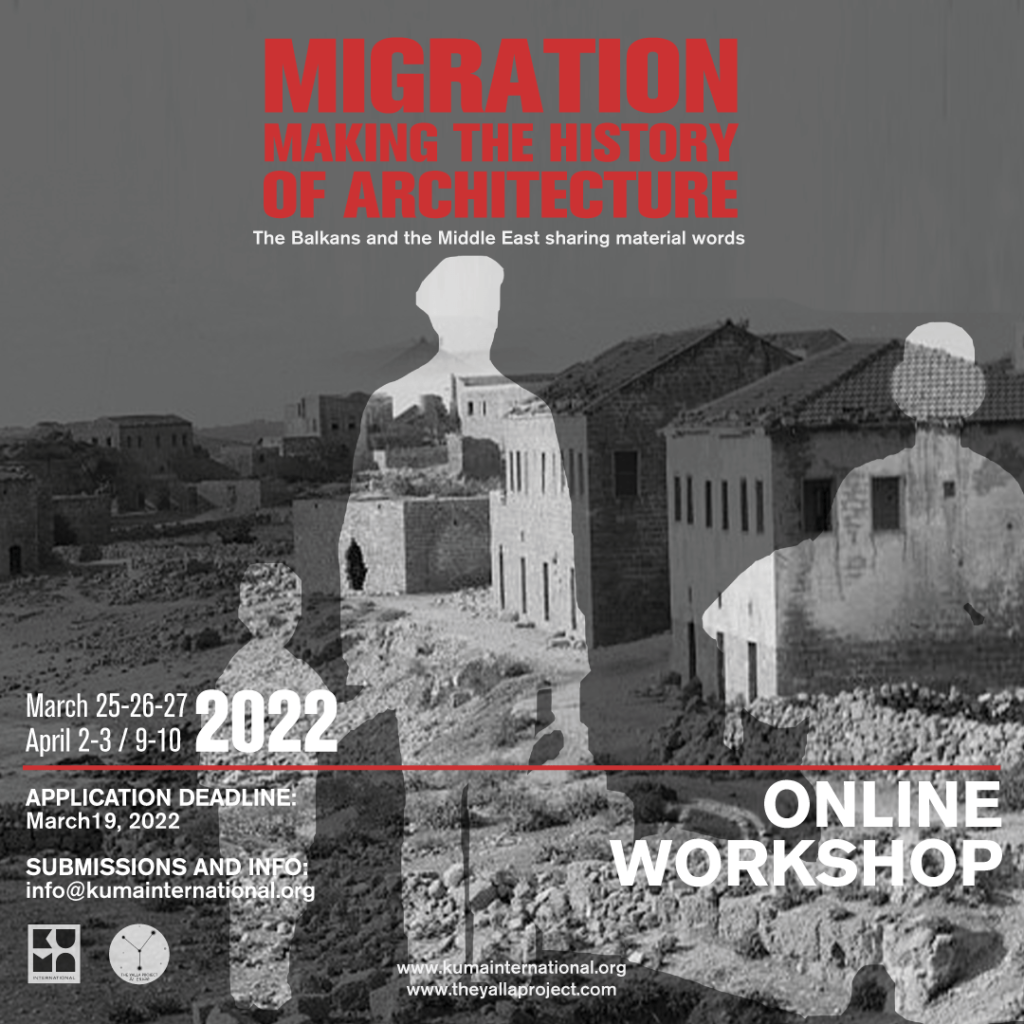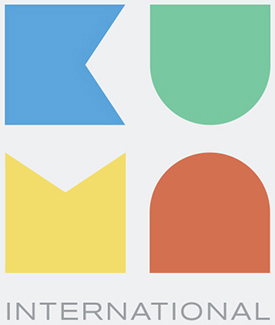MIGRATION MAKING THE HISTORY OF ARCHITECTURE
ONLINE WORKSHOP AND PUBLIC LECTURES
KUMA INTERNATIONAL and YALLA PROJECT
The Balkans and the Middle East sharing material words”
March 25-26-27, April 2-3, April 9-10
Since the last two decades, increasingly nationalist and xenophobic discourses have been spreading across the Globe, fomenting social divide, inequity, and violence. Although well distinct in terms of context-specific dynamics, reasons and narratives, nationalist predications across history and geography share the exaltation of the uniformity and purity of people as a founding character of solid nationhood. This selective narrative is based on the exclusion and a highly hierarchised interpretation of social and spatial structures, where the (myth of) uncontaminated indigenous is elevated as something superior. Proper of this narrative is the downward look on the foreign element, deemed as inferior, and the idea that hybridization with other cultures is a sign of decadence and corruption of customs. This perspective is untruthful to history, though. This destructive utopia is even more untenable in our wired contemporary, and it gives rise to dramatic, violent socio-spatial phenomena.
Indeed, migration and the accommodation of foreign communities posits many challenges and tensions and requires great efforts to learn how to live together and find a new balance. However, an attentive look at even the most remote corner of the world reveals how the exchange with the “other” is necessary to the local survival and enrichment. Mass migrations are a tragic feature of our times, with just another wave of refugees fleeing their country in this very moment at the borders of the European Union. However, displacement is not a prerogative of our age, and history can teach us a lot about how communities sorted out ways of coexisting.
Willing to respond to the endemic spreading of xenophobic and nationalist discourses that exalt the purity of the Nation (or even of the race), while indicating the foreign element as a mere threat, Kuma International and Yalla Project are proud to launch this workshop aimed to explore the exchange of material forms, knowledge, and know-how that happened through migrations.
The reflection will start from the observation on the exchange that occurred between the former Ottoman provinces in the Balkans and Caucasus and Palestine during the late 19th century. This will constitute the fil-rouge and the tool for grounding the debate with participants, who will be then invited to develop a reflection on their specific context.

For centuries, being united under the same power, the Balkans and Palestine enjoyed a facilitated circulation of people, contaminating each other with ideas, knowledge, practices, and languages – both immaterial and material. The late Ottoman period coincided with the progressive regression of the Empire’s borders from the northern Balkans towards the south (Kale, 2014). This withdrawal triggered the mass migration of Ottoman citizens from Eastern Europe to different parts of the remaining Empire, with a consistent flow heading to the Middle East and Palestine. Migrants carried with them their customs, traditions, as well as different types of knowledge, which spans from sciences to architectural forms, to everyday material know-how related to domestic life, such as food, practices and utensils. This milieu was destined to be in part absorbed and adopted by the context of resettlement, with habits and forms brought by newcomers eventually merging into the local discourse. In this sense, the workshop tackles architecture in a broad sense that concerns the fashioning and manufacturing of the everyday living environment, hence embracing aspects that involve the material culture and performative aspects of the ordinary life.
GOALS
By tackling this topic, the workshop aims to draw attention to and foster analytical skills on the materialisation of migrations in the local architectural language, valorising migrations as an enriching process that shapes our everyday environment, underscoring the existence and value of contaminations that underlie our everyday spaces.
The final goal of this workshop is to foster participants’ critical thinking towards an appreciation as to how our everyday realities are the outcome of the encounter, exchange (not always happy or peaceful, indeed!) and “contamination” of diverse peoples.
From the didactic point, the workshop pursues a methodological goal, which is to provide participants with essential tools for the critical reading of the everyday environment in its material expressions, appreciating it as a result of a historical process of exchanges that takes place through migration and displacement.
WORKSHOP STRUCTURE
This intensive workshop will unfold online on 3 weekends: March 26-27, April 2-3 and April 9-10, 2022. A special kick-start session will open the workshop on the evening of Friday, March 25, 2022.
Inspired by Christoph Girot’s “Four Trace Concept in Landscape Architecture” (1999), the workshop will articulate in three blocks: Landing, Grounding, Finding. Each block will combine lectures, teaching sessions, debate time, and remote assignments.
Teaching sessions will tackle the workshop’s topic providing participants with methodological tools, techniques, and examples, exploring specific aspects of the migration of architectural and material languages, using Palestine and its relationship with the Ottoman Balkans as a case study. During teaching sessions, participants will be driven through the unpacking of daily environments at different scales, highlighting “neologisms” and contaminations in the material language by forms imported from abroad. In particular, teaching sessions will focus on traces of the contribution of the Balkan communities that settled in Palestine at different stages of the Ottoman Empire. Sessions will provide participants with methods and techniques to critically understand and analyse the material aspects of the everyday.
The workshop is accompanied by a multi-disciplinary series of lectures, aimed at providing more ground to the discussion. The lecture series will host prominent scholars and academics from the international arena, whose work tackles the workshop topic or similar relevant cases from different subject areas, such as Architecture, Anthropology, History and Sociology.
PUBLIC LECTURES PROGRAM
25 March 2022
Making Places in New Spaces: Circassian Forced Migration in the late Ottoman Empire
Prof. Dawn Chatty, Oxford University
27 March 2022
Modernity in Ottoman Balkans & Migration
Dr. Isa Blumi, Stockholm University
2 April 2022
Ramallah’s transformation from rural to urban center in the first half of the 20th century: architecture, urbanism and immigration
Iyad Issa, Birzeit University
3 April 2022
Trailing the Circassians material culture from the Caucasus to the Levant
Dima Meiqari, Researcher
9 April 2022
Non-Islamic Art in Bosnia and Herzegovina During the Ottoman Period
Haris Dervišević, University of Sarajevo


